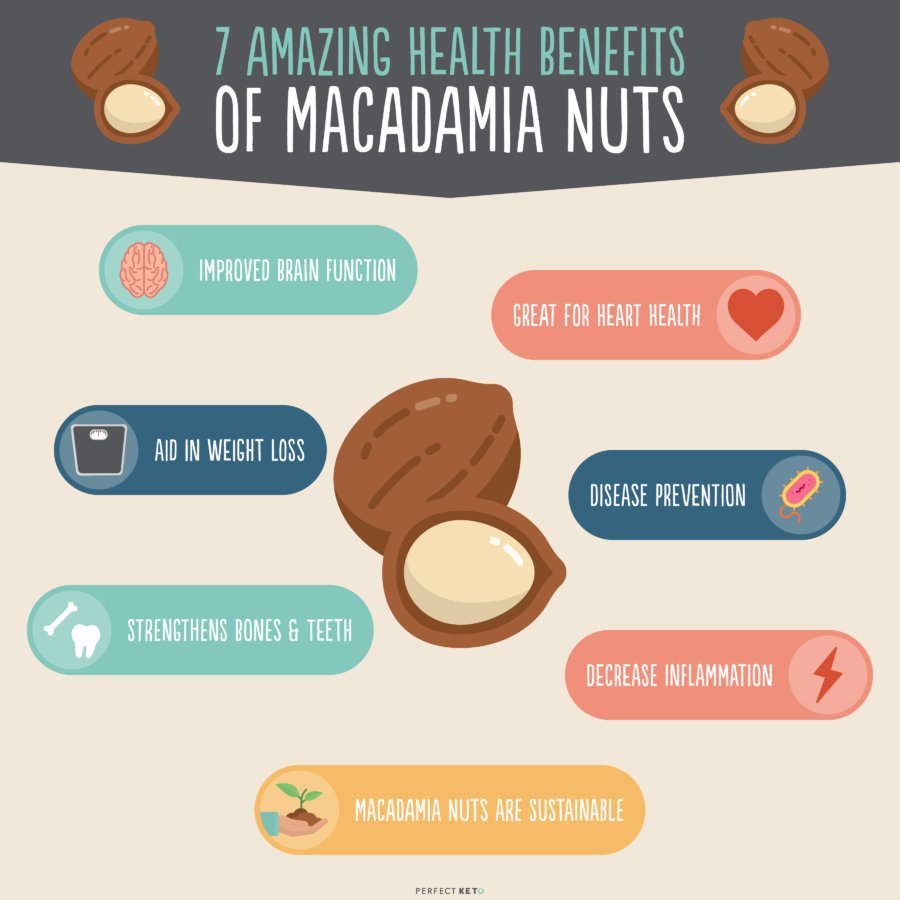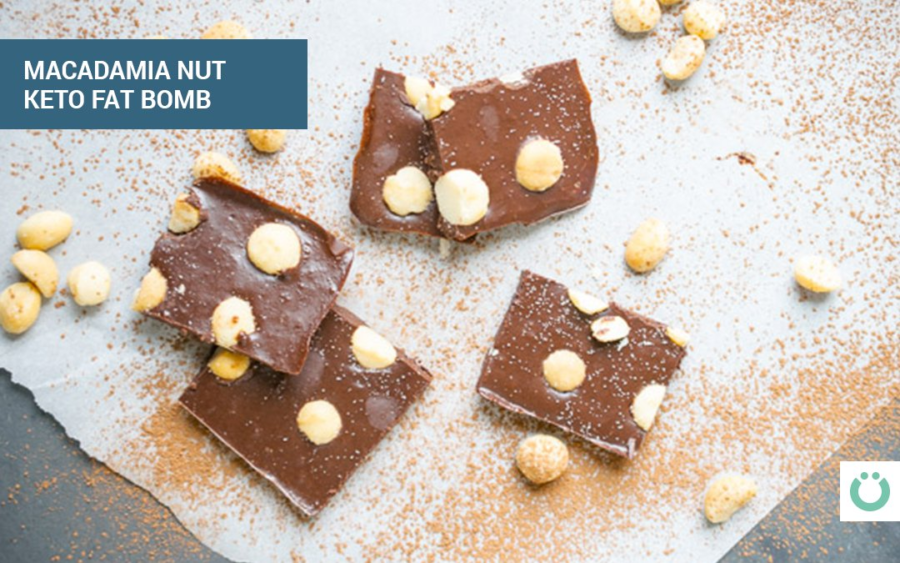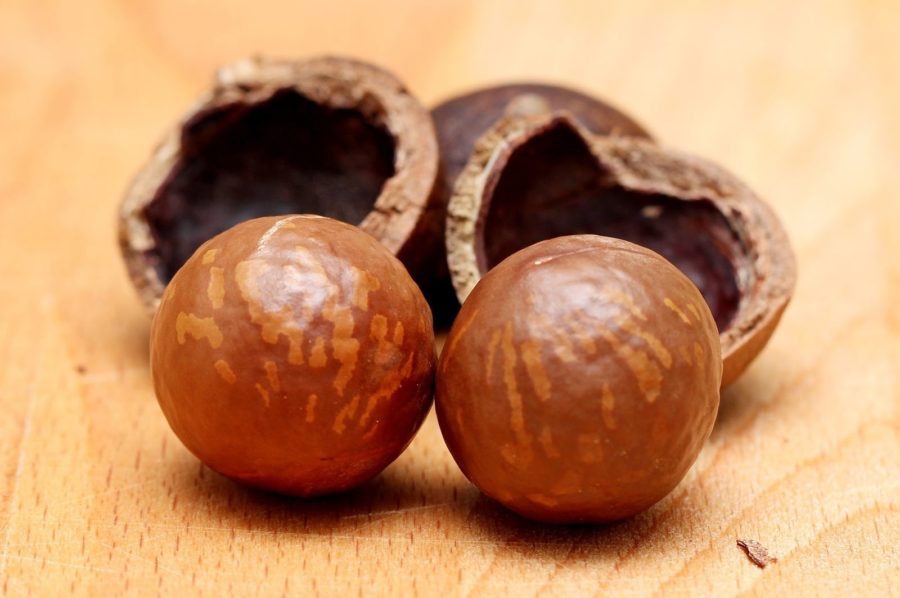- History of Macadamia Nuts
- 7 Amazing Benefits of Macadamia Nuts
- How to Buy and Store These Nuts
- Macadamia Nut Recipes
Macadamia nuts (Macadamia integrifolia) have the highest fat content of any tree nut, which is only one of the many reasons they’re so good for you.
Macadamia nuts are nutritional powerhouses. They’ve been linked to weight loss, healthy skin, and a decreased risk in cardiovascular disease and diabetes. Studies have also shown that consuming these beauties can help you live a longer, healthier life[*][*][*].
History of Macadamia Nuts
Macadamia nuts, like Brazil nuts, are actually a seed[*]. Native to Australia, the seeds are found in an extremely hard-shelled nut on a tropical evergreen tree. They are also referred to as the Queensland nut, Bush nut, Maroochi nut, and bauple nut[*].
Macadamias are major commercial crops of Hawaii and South Africa. They were brought to Hawaii in 1881 by the Australian William Herbert Purvis, who planted them in Kukuihaele, Hawaii.
The world’s largest manufacturer of these nuts, the Mauna Loa Macadamia Nut Corporation, founded their Hawaiian plantation in 1948[*].
These seeds are packed with incredible health benefits and there’s a reason (actually seven) why they’re the king of nuts on keto and one the best snacks on your ketogenic journey.
7 Amazing Benefits of Macadamia Nuts

Macadamia nuts are loaded with micronutrients, offering plenty of vitamins and minerals in one serving.
They are loaded with healthy monounsaturated fatty acids and are a good source of fiber, vitamin B6, calcium, copper, iron, magnesium, manganese, potassium, selenium, and zinc[*].
If you check out their nutrition facts, you’ll find they’re a great low-carb snack, with only 4 grams of carbohydrates per serving (60% of which is fiber), making the net carb count only 1.6 grams per serving. 1 oz. contains 21 grams of fat, beating other nuts like cashews, hazelnuts, pecans, and walnuts[*][*].
Macadamia nuts are loaded with nutrients that promote your long- and short-term health. Read on to learn how macadamia nuts are good for your health and the health of the environment too.
#1: Brain Function Support
The composition of macadamia nuts is between 72–75% fat, which explains their buttery texture. These fats are healthy, monounsaturated fatty acids[*].
One fatty acid, in particular, helps protect your brain: palmitoleic acid. It’s an omega–7 fatty acid — incredibly rare, but incredibly healthy[*].
Palmitoleic acid is a major component of myelin, the fatty, protective coating around your neurons. This protects your long-term brain health, fending off neurodegenerative diseases and mental disorders[*].
Macadamia nuts are also rich in copper and thiamine, both of which support brain function. Copper is needed to efficiently absorb and utilize iron, which in turn helps get oxygen to the brain, while thiamine, also known as vitamin B1, is essential for converting carbohydrates into energy[*][*].
This energy gives your brain the fuel it needs to boost your cognitive function and mood[*][*].
#2: Cardiovascular Support
Nuts have long been categorized as a heart-healthy snack. A 2015 meta-analysis study showed regular nut consumption was associated with a 26% decrease in the development of cardiovascular disease[*].
Even the American Heart Association, which usually dissuades people from eating foods high in fat, published an article stating regular nut consumption significantly decreased the risk of early mortality, especially in those who ate nuts eight or more times per week[*].
The monounsaturated fatty acids in macadamia nuts make them particularly beneficial to your heart.
Palmitoleic fatty acids — the same fatty acids that protect your brain — can support a healthy heart. They have been connected to[*]:
- Cardiovascular health
- Lower triglycerides
- Reduced inflammation
- Improved blood pressure
- Reduced lipid levels
Another monounsaturated fatty acid, oleic fatty acid, contributes to brain health by keeping blood pressure low and decreasing the risk of stroke.[*]
Macadamia seeds are also rich in vitamin E, a fat-soluble antioxidant that can balance cholesterol levels and lower the risk of cardiovascular incidents[*][*].
#3: Weight Loss Support
Against everything you were taught to believe, high-fat snacks like macadamia nuts can aid weight loss.
It’s true that just an ounce of these nuts contains 201 calories, most of which are from healthy fats[*]. So how can such a high-caloric food help you lose weight?
For starters, the dietary fiber in macadamia nuts can help increase satiety by binding to water, making you feel full. Dietary fiber has been shown to increase feelings of satiety aiding in weight loss[*][*].
Secondly, healthy fats may help reduce inflammation, one of the biggest contributors to weight gain[*].
Finally, this high-fat food contains just 1.5 grams of net carbs per serving. Since studies have shown that low-carb diets are more effective than low-fat diets for weight loss, macadamia nuts are one of your best allies on a ketogenic diet[*].
#4: Promote Disease Prevention
The healthy fats, fiber, and antioxidants in macadamia nuts make them a valuable tool in disease prevention.
As you read earlier on this list, healthy fats such as those in macadamia nuts nourish the nervous system and provide heart health benefits. What’s more, antioxidants in these seeds prevent and reduce cell damage caused by free radicals, thereby helping to prevent various diseases[*][*].
Several studies published in The American Journal of Clinical Nutrition and Nutrients have verified that eating nuts is linked to the prevention of several diseases[*][*].
#5: Bone Health Support
Tree nuts like macadamia nuts are rich in calcium, phosphorus, and magnesium. And it’s micronutrients like these that are hard to come by when you’re eating a dirty keto diet or not getting enough low-carb veggies.
This specific combination of minerals isn’t just good for overall health — it’s also been shown to prevent bone demineralization[*].
#6: Help Fight Inflammation
Inflammation is linked to diabetes, cancer, heart disease, weight gain, and a host of other diseases[*]. But regular nut consumption is linked to fighting inflammation[*].
The reason why macadamia nuts help combat inflammation: magnesium. This mineral is essential for optimum bone and teeth health, blood clotting, and sleep regulation[*][*] Magnesium deficiency plays an important part in chronic inflammation, which may lead to a higher risk of chronic disease[*][*].
University of South Australia studies concluded that nuts have exponential benefits for people with type 2 diabetes, by improving blood sugar levels and lipid metabolism[*].
#7: Environmentally Sustainable
Macadamia nuts aren’t just keto-friendly, they’re eco-friendly too.
Macadamia trees begin producing nuts after only five to seven years and can produce for up to 100 years. That’s 100 years of soil being protected from erosion, nutrient depletion, and chemical bombardment[*].
Plus, macadamia nuts are often grown sustainably, making them a great go-to snack for eco-conscious consumers looking to replace or reduce almond snacking.
How to Buy and Store These Nuts
Macadamia nuts can be eaten and purchased raw or roasted. If you’re looking for the most nutrients with the least amount of additives, always choose the raw version. You can always roast them at home.
If you’re craving roasted macadamia nuts and you’re pressed for time, be sure to check the ingredients label and don’t purchase any that have been roasted in vegetable oil.
Store macadamia nuts in an airtight container in a cool, dry place, like your pantry.
They also freeze very well. In fact, if you’re not going to eat them in the next two to three weeks, freezing is recommended. The high-fat content, especially the monounsaturated fat, can go rancid very quickly if left at warm temperatures for too long.
Who Should Avoid Macadamia Nuts (And Why)
Macadamia nuts are high in phosphorus, making them a concern for some kidney patients. If you have kidney-related health issues, ask your healthcare provider if you should consume these nuts.
If you’re allergic to other tree nuts, avoid macadamia nuts. Always keep macadamia nuts away from your dog, as they can be toxic to dogs[*].
Macadamia nuts do not appear to have any negative side effects for pregnant women and those with celiac disease. Even though they are naturally gluten-free, always check the label to make sure they weren’t exposed to gluten during processing.
Recipes Worth Trying
Wondering how you can get more macadamia in your diet? Give these keto-friendly recipes a try.
Macadamia Nut Fat Bomb
 Forget guilt and enjoy your chocolate already. These dark chocolate bombs offer a ton of nutrition: healthy fats, magnesium, iron, and protein. Plus, they taste great.
Forget guilt and enjoy your chocolate already. These dark chocolate bombs offer a ton of nutrition: healthy fats, magnesium, iron, and protein. Plus, they taste great.
Dry Roasted Macadamia Nuts

The simplest thing to do with the nuts is roast them. From there you can eat them or add them to other recipes. They make a great alternative for croutons on a salad.
To roast them, preheat your oven to 350℉. Place whole macadamia nuts (not halves or pieces) in a single layer on an unoiled cookie sheet — the nuts already have all the oil they need.
Roast for 5–10 minutes until they’re golden brown (and the air smells divine). Remove from oven, allow to cool, and enjoy.
Macadamia Keto Mousse

If you’ve been dreaming about a decadent, fluffy dessert, this mousse has your name written all over it. Made with creamy macadamia and cashew nut butter, this little treat will not only satisfy your sugar cravings but also deliver a good dose of healthy fats.
The Big Fat Deal
It’s time to recognize macadamia nuts as the nutritional powerhouse they are. As part of a healthy diet and lifestyle, macadamia nuts can help you lose weight, think clearly, maintain strong bones, and stave off cardiovascular disease and cancer.
Forget fatphobia and throw these sustainable nuts (which are really seeds) into your shopping cart. Sure, they might be a little pricey, but consider that a built-in incentive to keep your serving sizes in check.